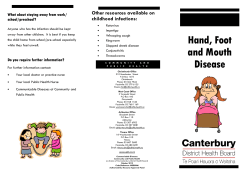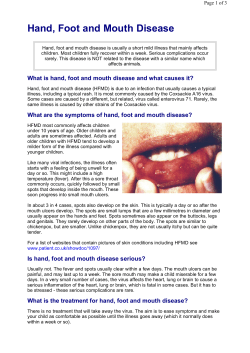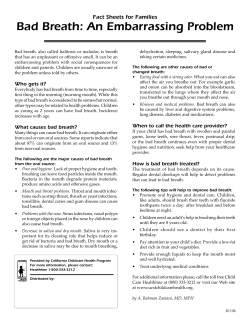
A Guide to the management of: Sore Mouth or Throat (Mucositis)
Oxford Centre for Head and Neck Oncology A Guide to the management of: Sore Mouth or Throat (Mucositis) Dry Mouth (Xerostomia) Oral Thrush (Candida) Information for patients This leaflet gives you some suggested remedies to help with your sore, dry mouth caused by radiotherapy which previous patients have found helpful. Other products may be available from your chemist. Some medications work well for one person and not for another. It is often a case of trial and error. However, to know if something works or not, you need to use it as instructed for at least 3 days. Many of these things can be used together to get maximum benefit. For example, taking a painkiller and using a product inside your mouth may help. Always start with good oral hygiene: •Brush your teeth at least twice a day with a fluoride toothpaste and a soft toothbrush •Use a mild salt-water mouthwash (½ teaspoon of salt in a mug of water) after meals or supplement drinks. page 2 Help for a sore or ulcerated mouth Aspirin gargle / mouthwash 300mg aspirin dissolved in ½ glass of water. Rinse around the mouth and spit out. Use up to 8 times in 24 hours, half an hour before meals. Check with your doctor or nurse if you can swallow it. Aspirin is available on prescription or can be bought over the counter at a chemist. Painkillers A combination of drugs can help. These will normally be prescribed by your doctor and may include paracetamol, co-codamol and Voltarol (diclofenac). If you have been prescribed paracetamol or co-codamol, DO NOT take any other preparations containing paracetamol. Always take medication regularly and before eating, drinking or exercises advised by the Speech and Language Therapist. Check with your healthcare professional before taking anything other than your prescription. Painkillers are available on prescription; some can be bought over the counter at a chemist. Mucosal protectors This is a group of medications designed to protect the inside of your mouth and tongue. You will experience changes in the lining of your mouth during your treatment. Pain can occur when nerve endings are exposed, and this is what happens with inflammation or ulceration. The aim of this group of medications is to coat the inflamed / ulcerated areas in your mouth. This stops the nerve endings which cause pain from being exposed, reducing pain and making the inside of your mouth and tongue feel more comfortable. All these products are available on prescription. •Orabase This is a paste that is applied to the ulcerated area and provides a protective coating. Works best on small areas and can be used as needed. page 3 •Gelclair This is an oral rinse, which coats the surface of your mouth forming a protective layer. It comes in individual 15ml sachets. Rinse around the mouth for 1 minute. However, you must not eat or drink for 1 hour after using it to allow it time to work. Gelclair can reduce pain and make your mouth more comfortable enabling you to eat and drink and providing relief for up to 7 hours. • Caphosol This is an oral rinse that lubricates and protects the inside of your mouth during radiotherapy treatment. Rinse 30mls around the mouth at least 4 times a day. Help for a dry mouth (xerostomia) Sip water regularly and carry a small bottle everywhere you go. Artificial saliva This is a saliva replacement you can spray into your mouth or suck as a lozenge, e.g. Glandosane, A.S. Saliva Orthana or Xerotin. It may have some benefit, but is short acting. Available on prescription or over the counter at a chemist. Salivary stimulants These products are designed to stimulate the production of your own saliva. For example: •Sugar-free chewing gum Chewing gum stimulates the production of your own saliva, and keeps your mouth feeling clean. Brands that contain Xylitol help protect your teeth from dental decay. •Sugar-free sweets These are OK, but if eaten in large quantities can have a laxative effect. page 4 •Saline (salt water) mouthwashes Saline solution stimulates your own salivary glands to produce more saliva, as well as also promoting helpful bacteria to help keep the mouth clean and debris free. •Biotene / Oralbalance These products contain a triple enzyme system that helps to protect the mouth against bacteria whilst also stimulating the production of saliva. This comes in a set of 3 products, including a mouthwash, toothpaste and gel. They can be used together or each one on their own. The gel is particularly useful when used before bed, as it helps to alleviate dryness over night. All 3 products are available on prescription as a “system” or the gel on its own (toothpaste on its own not available on prescription). Can also be bought over the counter at a chemist or ordered from the manufacturer direct, Tel: 01438 743070. There is also a web site, www.biotene.co.uk. •BioXtra This is another set of products including a mouthwash, toothpaste, gel and gum. Use in the same way as Biotene. Gel is available on prescription; other products over the counter at a chemist. Or mail order from Toothbrush Direct Tel: 01273 476471. If any problems contact BioXtra via e-mail: info@molar.ltd.uk. • Saliva Stimulating Tablets (SST) These are tablets that dissolve slowly in the mouth. Probably more useful after radiotherapy when tissues have healed. Available on prescription or over the counter at a chemist. Many patients who have undergone radiotherapy have told us they found it helpful to combine painkillers with a mucosal protector and a salivary stimulant during their treatment. If you are unsure, then please discuss this with your doctor or nurse. page 5 Other ideas Sometimes other medication may help – discuss this with your doctor. Patients have sometimes commented that acupuncture has helped a dry mouth. Avoid alcohol, tobacco, spicy / dry foods, very hot or cold food and drinks, and salty or acidic foods, such as vinegar, citrus fruits, citrus drinks or curries. Thrush (candida) It is common to get a white coating on the inside of your mouth. This is caused by a fungal infection known as thrush (candida). The medical team responsible for your care will be able to diagnose thrush and prescribe treatment medication. The medication may be liquid, lozenges or tablets which you must take as prescribed. There are side-effects to these medications that can include diarrhoea and sickness. If you experience these side-effects then please contact your medical team. Thrush can be painful and may affect your ability to eat and drink. Prescriptions From April 2009 anyone with a cancer diagnosis is entitled to free prescriptions. If you have not yet applied for an exemption card, please see your GP or see specialist nurse. page 6 How to contact us / further information If you have any questions or concerns, or need any further information, please contact your GP, or telephone: Head and Neck Cancer Specialist Nurses Tel: 01865 234346 (Monday-Friday 08.00-16.00) Radiotherapy Specialist Nurses Tel: 01865 235473 (Monday-Friday 08.30-16.30) Oncology Ward Tel: 01865 235012 (24 hours/day) You will also be given the specialist nurses leaflet which contains information on websites etc. that you may find helpful. page 7 If you need an interpreter or need a document in another language, large print, Braille or audio version, please call 01865 221473 or email PALSJR@orh.nhs.uk Compiled by Head & Neck Oncology Team Version 7, October 2010 Review, October 2013 Oxford Radcliffe Hospitals NHS Trust Oxford OX3 9DU www.oxfordradcliffe.nhs.uk/patientinformation OMI 2364
© Copyright 2025





















